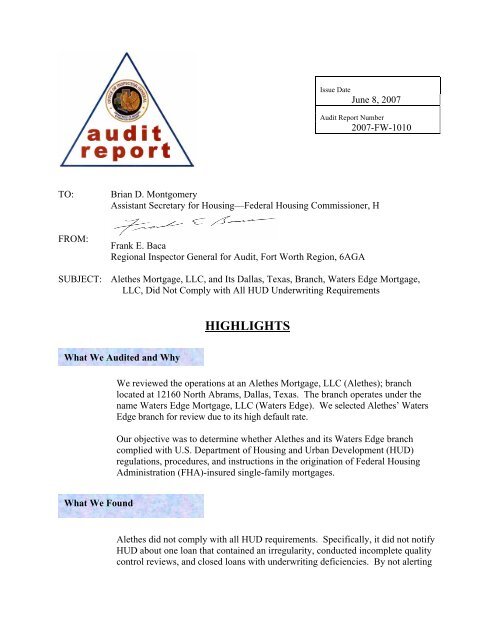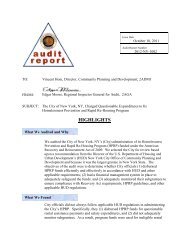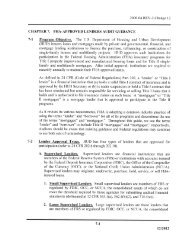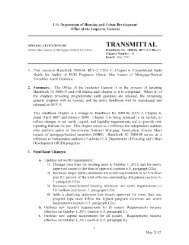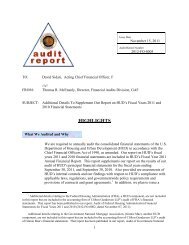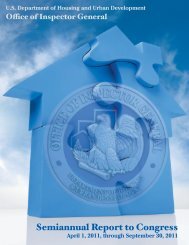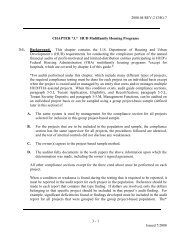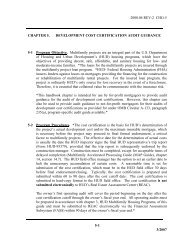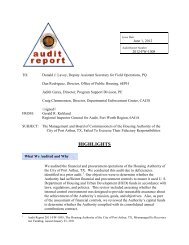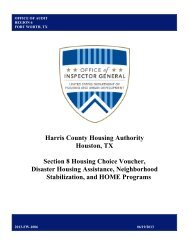Audit Report Number - Hud-Oig
Audit Report Number - Hud-Oig
Audit Report Number - Hud-Oig
Create successful ePaper yourself
Turn your PDF publications into a flip-book with our unique Google optimized e-Paper software.
Issue Date<br />
June 8, 2007<br />
<strong>Audit</strong> <strong>Report</strong> <strong>Number</strong><br />
2007-FW-1010<br />
TO:<br />
Brian D. Montgomery<br />
Assistant Secretary for Housing—Federal Housing Commissioner, H<br />
FROM:<br />
Frank E. Baca<br />
Regional Inspector General for <strong>Audit</strong>, Fort Worth Region, 6AGA<br />
SUBJECT: Alethes Mortgage, LLC, and Its Dallas, Texas, Branch, Waters Edge Mortgage,<br />
LLC, Did Not Comply with All HUD Underwriting Requirements<br />
HIGHLIGHTS<br />
What We <strong>Audit</strong>ed and Why<br />
We reviewed the operations at an Alethes Mortgage, LLC (Alethes); branch<br />
located at 12160 North Abrams, Dallas, Texas. The branch operates under the<br />
name Waters Edge Mortgage, LLC (Waters Edge). We selected Alethes’ Waters<br />
Edge branch for review due to its high default rate.<br />
Our objective was to determine whether Alethes and its Waters Edge branch<br />
complied with U.S. Department of Housing and Urban Development (HUD)<br />
regulations, procedures, and instructions in the origination of Federal Housing<br />
Administration (FHA)-insured single-family mortgages.<br />
What We Found<br />
Alethes did not comply with all HUD requirements. Specifically, it did not notify<br />
HUD about one loan that contained an irregularity, conducted incomplete quality<br />
control reviews, and closed loans with underwriting deficiencies. By not alerting
What We Recommend<br />
HUD to potential fraud or serious violations, Alethes increased the FHA<br />
insurance fund’s risk.<br />
<strong>Audit</strong>ee’s Response<br />
We recommend that HUD’s assistant secretary for housing—federal housing<br />
commissioner and chairman of the Mortgagee Review Board require Alethes to<br />
indemnify one loan for $168,358, 1 and ensure that it complies with HUD’s<br />
underwriting requirements.<br />
For each recommendation without a management decision, please respond and<br />
provide status reports in accordance with HUD Handbook 2000.06, REV-3. Please<br />
furnish us copies of any correspondence or directives issued because of the audit.<br />
We provided a draft report to Alethes on April 16, 2007, and held an exit<br />
conference on April 20, 2007. Based on information provided during the exit<br />
conference, we provided a revised draft report on April 25, 2007. Alethes<br />
provided written comments on May 25, 2007. Alethes disagreed that it should<br />
indemnify one loan. However, it did agree that its quality control contractor<br />
needs to comply with all HUD requirements. Based on additional documentation<br />
provided by Alethes, we modified the report as necessary. Alethes’ response<br />
along with our evaluation is included in Appendix B of this report. We redacted<br />
names of borrowers and did not include the attachments due to the volume.<br />
1<br />
The projected loss is $48,824 based on HUD’s insurance loss rate of 29 percent.<br />
2
TABLE OF CONTENTS<br />
Background and Objectives 4<br />
Results of <strong>Audit</strong> 5<br />
Finding: Alethes Did Not Comply All HUD Underwriting Requirements<br />
Scope and Methodology 9<br />
Internal Controls 10<br />
Appendixes<br />
A. Schedule of Questioned Costs and Funds to Be Put to Better Use 11<br />
B. <strong>Audit</strong>ee Comments and OIG’s Evaluation 12<br />
C. Required Quality Control Review Reverifications Missing from 8 of 14 Files<br />
Reviewed<br />
26<br />
D. Case Narratives 27<br />
3
BACKGROUND AND OBJECTIVES<br />
The National Housing Act, as amended, authorizes the U. S. Department of Housing and Urban<br />
Development (HUD) to provide mortgage insurance for single-family homes. HUD must<br />
approve a lender that originates, purchases, holds, or sells Federal Housing Administration<br />
(FHA)-insured loans. Lenders must follow the statutory and regulatory requirements of the<br />
National Housing Act and HUD’s instructions, guidelines, and regulations when originating<br />
insured loans. Lenders that do not follow these requirements are subject to administrative<br />
sanctions.<br />
Waters Edge Mortgage, LLC (Waters Edge), previously known as HomeQuest Mortgage, is now<br />
owned by Alethes Mortgage, LLC (Alethes). Alethes created Waters Edge on October 25, 2004.<br />
Fourteen 2 loans originated by one Waters Edge underwriter during the review period, October<br />
2004 through September 2006, defaulted. The majority of the loans consisted of new or existing<br />
construction with one refinanced loan. The defaults occurred after 0 to 14 payments. The<br />
mortgage amounts totaled $1.74 million with $439,463 paid on six claims.<br />
Alethes was conceived as AmeriNET Mortgage in 1998. In 2001, AmeriNET was<br />
reincorporated into Alethes. Originally, Alethes was a loan correspondent. However, on<br />
October 31, 2003, it received HUD’s approval to be an originator of HUD loans. HUD<br />
terminated two of Alethes’ other branches located in Austin, Texas, on May 15, 2006, 3 and July<br />
6, 2006. 4<br />
As part of our 2006 annual audit plan, we selected Alethes’ Waters Edge branch because of its<br />
high default rate involving one of its underwriters.<br />
Our objective was to determine whether Alethes and its Waters Edge branch complied with HUD<br />
regulations, procedures, and instructions in the origination of FHA-insured single-family<br />
mortgages.<br />
2<br />
3<br />
4<br />
Also, apart from the 14 loans reviewed, one additional defaulted loan closed at the Waters Edge branch but was<br />
originated by a different underwriter during the audit scope. In total, we reviewed 15 loans.<br />
Mortgagee number 1756700441.<br />
Mortgagee number 1756701004.<br />
4
RESULTS OF AUDIT<br />
Finding: Alethes Did Not Fully Follow All HUD Underwriting and<br />
Other Compliance Requirements<br />
Alethes did not fully follow all HUD underwriting and other compliance requirements.<br />
Specifically, it did not notify HUD about a loan that contained an irregularity, conducted<br />
incomplete quality control reviews, and closed loans with underwriting deficiencies. By not<br />
alerting HUD to potential fraud or other serious violations, Alethes subjected the FHA insurance<br />
fund to risk. Further, since Alethes did not meet quality control review and origination<br />
requirements, HUD does not have assurance that loans originated by Alethes met HUD<br />
guidelines.<br />
Alethes Did Not Notify HUD of<br />
Potential Fraud<br />
Alethes did not notify HUD of an irregularity on one loan. The loan 5 contained<br />
suspicious employment documents. Alethes stated that the borrower<br />
manufactured documents. However, Alethes did not notify HUD although the<br />
loan servicer required Alethes to indemnify this loan after its review.<br />
HUD required 6 Alethes to notify it of findings of fraud or other serious violations<br />
within 60 days of the initial discovery. Alethes’ legal counsel believed that<br />
Alethes did not have to report these matters because they had not yet been<br />
adjudicated. However, HUD needs to be made aware of problems with insured<br />
loans before adjudication.<br />
Alethes did not perform a quality control review of one defaulted loan until its<br />
servicer notified it that the loan had reached the 90-days deliquent status within<br />
12 months of origination. The servicer’s quality control review found that the<br />
borrower misrepresented income and requested Alethes to repurchase the loan.<br />
After being notified of the problem, Alethes conducted its own quality control<br />
review of the loan and also concluded that the borrower misrepresented income.<br />
To originate the loan, Alethes stated that it relied upon the manufactured<br />
documents relating to income from a second job to qualify the loan. Further, a<br />
false verbal employment verification may have occurred.<br />
5<br />
6<br />
Loan number 491-8687429.<br />
HUD Handbook 4060.1, REV-2, “FHA Title II Mortgage Approval Handbook,” paragraph 7-3J.<br />
5
Alethes Performed Incomplete<br />
Quality Control Reviews<br />
Alethes did not conduct complete quality control reviews. Specifically, Alethes<br />
did not (1) use HUD’s Neighborhood Watch system to determine which loans<br />
defaulted within the first six months, (2) verify all required documents during<br />
quality control reviews, or (3) select 10 percent of FHA loans for one of three<br />
months reviewed,<br />
Neighborhood Watch system. Alethes did not use HUD’s Neighborhood Watch<br />
system to determine which loans defaulted within the first six months. Instead, it<br />
relied upon its servicer to inform it when a loan defaults within the first six<br />
months (see previous section). HUD regulations state, “[i]n addition to the loans<br />
selected for routine quality control reviews, mortgagees must review all loans<br />
going into default within the first six payments.” 7 Alethes’ quality control plan<br />
contains the same requirement. Alethes needs to use HUD’s Neighborhood Watch<br />
as a resource to determine whether loans go into default within the first six<br />
months and not rely upon its servicer to provide this information.<br />
Verification of documents. HUD requirements 8 and Alethes’ quality control<br />
plan 9 require reverification of certain documents. According to Alethes’ quality<br />
control plan, written reverification must be attempted, and if it cannot be<br />
obtained, then a verbal reverification may be completed. Alethes and its quality<br />
control contractor did not comply with either its quality control plan or HUD<br />
requirements for 8 of the 14 loans reviewed. See appendix C for details.<br />
Review of 10 percent of FHA loans. For one of three months reviewed, Alethes’<br />
quality control contractor did not select and review 10 percent of FHA loans<br />
originated as required. 10 Alethes’ quality control contractor selects loans based<br />
on the branch and loan officer to ensure that all loan officers are reviewed based<br />
on their output. The contractor believed that it met the intention of the<br />
requirement because in some months it over selected FHA loans for review and in<br />
some months it under selected loans. However, this process did not always<br />
ensure that 10 percent of FHA loans were selected for quality control review.<br />
7<br />
8<br />
9<br />
10<br />
HUD Handbook 4060.1, REV-2, “FHA Title II Mortgage Approval Handbook,” paragraph 7-6 D.<br />
HUD Handbook 4060.1, REV-2, “FHA Title II Mortgage Approval Handbook,” chapter 7.<br />
Alethes’ quality control plan 2005, part IVA1 and 2.<br />
HUD Handbook 4060.1, REV-2, “FHA Title II Mortgage Approval Handbook,” paragraph 7-6 and Alethes'<br />
Quality Control Plan p 2."<br />
6
Alethes Closed Loans With<br />
Underwriting Deficiencies<br />
Alethes did not comply with all underwriting and compliance requirements in that<br />
it did not (1) always properly evaluate borrowers’ credit by adding nontraditional<br />
credit items to borrowers’ credit reports, (2) include compensating factors in the<br />
mortgage credit analysis worksheet as required on one loan, or (3) document the<br />
transfer of gift funds from the donor to the borrower.<br />
Use of nontraditional credit items. Alethes’ Waters Edge branch added<br />
nontraditional credit 11 items to borrowers’ credit reports, giving the appearance<br />
that the credit was enhanced. Borrowers served by Waters Edge generally had<br />
poor credit histories. According to Alethes’ employees at the Waters Edge<br />
branch, the credit score was not rescored by the addition of these items because of<br />
the cost. Waters Edge relied upon the credit company to verify the validity of the<br />
information, although at one time, it performed the verifications.<br />
For four of the borrowers, Waters Edge added payroll deductions to the credit<br />
reports. HUD requirements 12 specifically disallow payroll insurance deductions<br />
to be considered as periodic payments on a regular basis. As shown below,<br />
Waters Edge added the medical, dental, and vision insurance payroll deductions<br />
to a borrower’s credit report.<br />
In another case, the updated credit report showed that the borrower paid for rent<br />
as well as water. However, the borrower received a housing choice voucher,<br />
which included an allowance for utilities. In this instance, the borrower’s credit<br />
was enhanced by the appearance that the borrower paid montly, when in reality<br />
HUD paid the rent and the utilities. Additionally, Alethes added the child card<br />
expense to this borrower’s credit report.<br />
11<br />
12<br />
Nontraditional credit uses trade items not normally used to establish credit such as day care expenses.<br />
HUD Handbook 4155.1, REV-5, “Mortgage Credit Analysis for Mortgage Insurance, One to Four Family<br />
Properties,” paragraph 2-4B2.<br />
7
Compensating factors. For one loan, Alethes did not include compensating factors<br />
on the mortgage credit analysis worksheet when the liability factors exceed HUD<br />
benchmark guidelines. HUD regulations state that past credit history determines<br />
the borrower’s attitude toward credit and strong compensating factors need to<br />
offset the borrower’s slow payments, judgments, and delinquent accounts.<br />
Documentation of gift transfers. Alethes did not document the transfer for any of<br />
the loans that received gift funds. HUD regulations state that the lender must<br />
document the transfer of funds from the donor to the borrower.<br />
Conclusion<br />
Alethes did not fully follow HUD requirements and sound underwriting in loans<br />
reviewed and should indemnify HUD for one loan. While the majority of loans<br />
reviewed did not disclose significant departures from HUD requirements, Alethes<br />
needs to improve its underwriting and quality control. These improvements<br />
would improve Alethes’ compliance with HUD requirements and lower the risk to<br />
the FHA insurance fund.<br />
Recommendations<br />
We recommend that HUD’s assistant secretary for housing—federal housing<br />
commissioner and chairman of the Mortgagee Review Board<br />
1A. Require Alethes to indemnify the loan with an original mortgage amount of<br />
$168,358. The projected loss is $48,824 based on HUD’s insurance loss rate<br />
of 29 percent.<br />
1B. Require Alethes to ensure that its quality control contractor complies with all<br />
HUD regulations and Alethes’ quality control plan, including reporting<br />
potential fraud and other serious violations to HUD and reviewing<br />
Neighborhood Watch for loans defaulting within six months, verifying<br />
required documents, and performing quality control reviews of 10 percent of<br />
FHA loans.<br />
1C. Ensure that Alethes complies with HUD’s underwriting requirements,<br />
including not enhancing borrowers’ credit, documenting compensating<br />
factors when exceeding liability ratios, and obtaining gift transfer<br />
documentation.<br />
8
SCOPE AND METHODOLOGY<br />
To accomplish our audit objectives, we<br />
• Reviewed applicable HUD handbooks and mortgagee letters.<br />
• Reviewed 15 defaulted loans 13 originated 14 by Alethes from October 2004 to September<br />
2006. We added one defaulted loan to our scope that Alethes’ quality control review<br />
found contained questionable documentation.<br />
• Examined closing documentation including credit reports, appraisals, and loan<br />
applications.<br />
• Conducted interviews with officials of Alethes and Waters Edge; Alethes’ quality<br />
assurance contractor, Covenant Mortgage; and the HUD Quality Assurance Division.<br />
• Contacted borrowers by mail, telephone, and in-person interviews.<br />
• Performed site visits at seven properties.<br />
• Reviewed Alethes’ quality control plan.<br />
In addition, we relied on data maintained by HUD in its Neighborhood Watch system. However,<br />
we did not perform a detailed analysis of the reliability of this computer database.<br />
The audit covered the period October 2004 to September 2006. We conducted our fieldwork at<br />
our office in Fort Worth, Texas; Waters Edge’s office in Dallas, Texas; and Alethes’ office in<br />
Austin, Texas, from December 2006 through February 2007. We performed the audit in<br />
accordance with generally accepted government auditing standards.<br />
13<br />
14<br />
Out of a universe of 150 loans in the Fort Worth and Dallas jurisdiction, the underwriter reviewed closed 62 (41<br />
percent) of the loans.<br />
One underwriter originated 14 of the 15 loans selected for review.<br />
9
INTERNAL CONTROLS<br />
Internal control is an integral component of an organization’s management that provides<br />
reasonable assurance that the following objectives are being achieved:<br />
• Effectiveness and efficiency of operations,<br />
• Reliability of financial reporting, and<br />
• Compliance with applicable laws and regulations.<br />
Internal controls relate to management’s plans, methods, and procedures used to meet its<br />
mission, goals, and objectives. Internal controls include the processes and procedures for<br />
planning, organizing, directing, and controlling program operations. They include the systems<br />
for measuring, reporting, and monitoring program performance.<br />
Relevant Internal Control<br />
We determined the following internal controls were relevant to our audit<br />
objectives:<br />
• Quality control plan—Policies and procedures that management requires<br />
to reasonably ensure implementation of HUD quality control<br />
requirements.<br />
• Loan origination process—Policies and procedures that management<br />
requires to reasonably ensure that the loan origination process complies<br />
with HUD program requirements.<br />
We assessed the relevant controls identified above. A significant weakness exists<br />
if management controls do not provide reasonable assurance that the process for<br />
planning, organizing, directing, and controlling program operations will meet the<br />
organization’s objectives.<br />
Significant Weakness<br />
Based on our review, we believe no significant weaknesses existed.<br />
10
APPENDIXES<br />
Appendix A<br />
SCHEDULE OF QUESTIONED COSTS<br />
AND FUNDS BE PUT TO BETTER USE<br />
Recommendation<br />
number<br />
Ineligible 1/<br />
Funds to be put<br />
to better use 2/<br />
1A $48,824<br />
1/ Ineligible costs are costs charged to a HUD-financed or HUD-insured program or activity<br />
that the auditor believes are not allowable by law; contract; or federal, state, or local<br />
policies or regulations.<br />
2/ Recommendations that funds be put to better use are estimates of amounts that could be<br />
used more efficiently if an Office of Inspector General (OIG) recommendation is<br />
implemented. This includes reductions in outlays, deobligation of funds, withdrawal of<br />
interest subsidy costs not incurred by implementing recommended improvements,<br />
avoidance of unnecessary expenditures noted in preaward reviews, and any other savings<br />
which are specifically identified. The Inspector General Act, section 5, paragraph (4) d,<br />
states that this category includes indemnification agreements between<br />
mortgagees/lenders/issuers and the Mortgagee Review Board not to file certain claims in<br />
the future on selected FHA insurance cases.<br />
11
Appendix B<br />
AUDITEE COMMENTS AND OIG’S EVALUATION<br />
Ref to OIG Evaluation<br />
<strong>Audit</strong>ee Comments<br />
12
Comment 1<br />
13
Comment 2<br />
15
Comment 3<br />
Comment 4<br />
20
Comment 5<br />
21
Comment 6<br />
22
Comment 8<br />
Comment 2<br />
Comments 4,<br />
5, & 6<br />
Comment 7<br />
23
Comment 8<br />
24
OIG Evaluation of <strong>Audit</strong>ee Comments<br />
1. While we appreciate Alethes for modifying its quality control plan and practice, we<br />
maintain that notification to HUD should be sooner. Alethes was notified of the potential<br />
misrepresentation on June 16, 2006, but does not believe it has a duty to report that<br />
information to HUD until 60 days after October 27, 2006, or December 26, 2006, over six<br />
months after it was notified. We maintain that Alethes should have reported this matter to<br />
HUD within 60 days of June 16, 2006.<br />
2. Alethes agreed with the recommendation. In the instances where Alethes provided<br />
documentation to support its position, we made changes to the report.<br />
3. Our conclusion was based upon Alethes’ quality control plan that required a monthly<br />
review of 10 percent of loans.<br />
4. Nontraditional credit is only for borrowers without normal trade references. It is not to be<br />
used to enhance the credit history of a borrower with a poor payment history. 15 Alethes<br />
agreed that many of its borrowers have poor credit histories. We maintain that the purpose<br />
of adding of payroll deductions, specifically prohibited by HUD, and rental information to<br />
credit reports was to enhance borrowers’ poor payment histories.<br />
5. Alethes stated that its standard underwriting procedure is to include all compensating<br />
factors on the final Mortgage Credit Analysis Worksheet. Our review confirmed this.<br />
However, for one loan they did not add the compensating factors.<br />
6. Alethes agreed that the files provided to the auditor did not contain documentation of the<br />
gift. Further, in an interview with Alethes’ attorney and underwriter, they both agreed that<br />
Alethes did not obtain the gift transfer documentation.<br />
7. We amended the internal control section to reflect that the issues were minor and not<br />
significant.<br />
8. In this specific instance, Alethes had red flags of potential problems including the loan<br />
being referred to them by a builder because of insufficient income. Further, Alethes staff<br />
questioned the authenticity of income documentation and quality control staff was not able<br />
to reconfirm the existence of the bank employee that verified the borrower’s bank balance.<br />
By ignoring these red flags, Alethes put the FHA insurance fund at risk; therefore, it should<br />
indemnify the loan.<br />
15<br />
HUD Handbook 4155.1, REV-5, “Mortgage Credit Analysis for Mortgage Insurance, One to Four Family<br />
Properties, “ paragraph 2-4 B 2<br />
25
Appendix C<br />
Loan file<br />
number<br />
REQUIRED QUALITY CONTROL REVIEW<br />
REVERIFICATIONS MISSING<br />
FROM 8 OF 14 FILES REVIEWED<br />
Credit report<br />
reverification<br />
Verification<br />
of<br />
employment<br />
Verification<br />
of deposit<br />
Verification<br />
of gift letters<br />
Verification<br />
of mortgage<br />
or rent<br />
No No Yes<br />
Opinion of<br />
quality of<br />
loan stated<br />
492-7586253 Yes Yes No<br />
(fee required)<br />
491-8671362 Yes Yes No No No Yes<br />
491-8619123 Yes No/yes a No No No Yes<br />
491-8687429 Yes Yes/no b Yes c No No Yes<br />
491-8614421 Yes Yes Yes No No Yes<br />
491-8663048 Yes d Yes No No No Yes<br />
491-8616422 Yes Yes No No No Yes<br />
491-8601428 Yes Yes No e No No Yes f<br />
a<br />
b<br />
c<br />
d<br />
e<br />
f<br />
Only the wife's employment was verified.<br />
Verification of employment was for one employer and not the second employer.<br />
Comparison of bank account verification to bank statements submitted for the loan revealed significant<br />
differences.<br />
The credit report showed delinquent rent owed to the landlord that was verified as current at the time of the<br />
loan. The difference was not reconciled by Alethes.<br />
The reviewer could not verify the 401K. The loan application said the borrower did not have a checking<br />
account, but the borrower indicated to OIG that she did have and has always had a checking account.<br />
The quality control contractor questioned why this loan was approved with bankruptcy and late payments after<br />
bankruptcy. However, Alethes’ underwriter stated that the bankruptcy was dismissed and was not considered<br />
for the loan approval.<br />
26
Appendix D<br />
Case Narrative for 491-8687429<br />
Mortgage Amount: $168,358<br />
Date of Loan Closing: August 5, 2005<br />
Gift Amount: $5,130<br />
CASE NARRATIVES<br />
Underwriting Deficiencies Unexplained income balance changes, nontraditional credit items<br />
added to enhance credit, and gift fund transfer not documented.<br />
Summary:<br />
Unexplained income that should have been questioned by the lender<br />
o The borrower’s bank balance showed a $1 balance on June 13, 2005, and $3,280.24<br />
on July 25, 2005, but the increase was not explained in the file. The bank statement<br />
reflected payroll from Pappas Partners which is not listed as an employer of borrower.<br />
o Print outs of on-line bank statements provided by borrower's boyfriend/common-law<br />
husband contained alterations. For example, a faxed copy of bank statement from the<br />
boyfriend/common-law husband’s account shows Denny's payroll deposited for the<br />
period of June 27, 2005 to July 25, 2005. Alterations include showing a deposit with<br />
a "-" instead of a "+" like other deposits on the bank statement.<br />
o The borrower account used for loan purposes had no rent or everyday expenses<br />
reflected in withdrawals. The borrower stated she did not deposit her Denny's pay<br />
into her checking account, however, her Denny pay stubs reflect an automatic<br />
deposit. This conflicted with the bank statement provided by the borrower.<br />
o Mailing address on W-2's for borrower is different for the three employers W-2's for<br />
tax years 2003 and 2004 even though borrower reported she had been renting same<br />
apartment since 2002.<br />
HUD requires 16 the lender to determine a borrower’s ability and willingness to repay<br />
the mortgage debt, thus limiting the probability of default and collection difficulties.<br />
Further HUD requires 17 a verification of deposit, along with the most recent bank<br />
statement, to verify savings and checking accounts. If there is a large increase in an<br />
16<br />
17<br />
HUD Handbook 4155.1 REV-5, “Mortgage Credit Analysis for Mortgage Insurance, One to Four Family<br />
Properties,” paragraph 2-1.<br />
HUD Handbook 4155. 1 REV-5 “Mortgage Credit Analysis for Mortgage Insurance, One to Four Family<br />
Properties,” paragraph 2-10 b.<br />
27
account, or the account was opened recently, the lender must obtain a credible<br />
explanation of the source of those funds.<br />
Added non-traditional credit items to enhance credit<br />
Waters Edge added three non-traditional credit items to enhance the borrower’s credit<br />
report. HUD regulations 18 do not allow a borrower with poor credit to enhance their<br />
credit with non-traditional credit.<br />
No documentation of gift funds transfer<br />
Recommendation:<br />
Alethes did not document the transfer of the gift funds. HUD regulation 4155.1 Chg<br />
4 2-10 C. states the lender must document the transfer of the funds from the donor to<br />
the borrower.<br />
We recommend that the assistant secretary for housing—federal housing<br />
commissioner require Alethes to:<br />
A. Indemnify the loan with an original mortgage amount of $168,358. The<br />
projected loss is $48,824 based on HUD's insurance loss rate of 29 percent.<br />
18<br />
HUD Handbook 4155.1 REV-5 “Mortgage Credit Analysis for Mortgage Insurance, One to Four Family<br />
Properties,” paragraph 2-4.<br />
28


